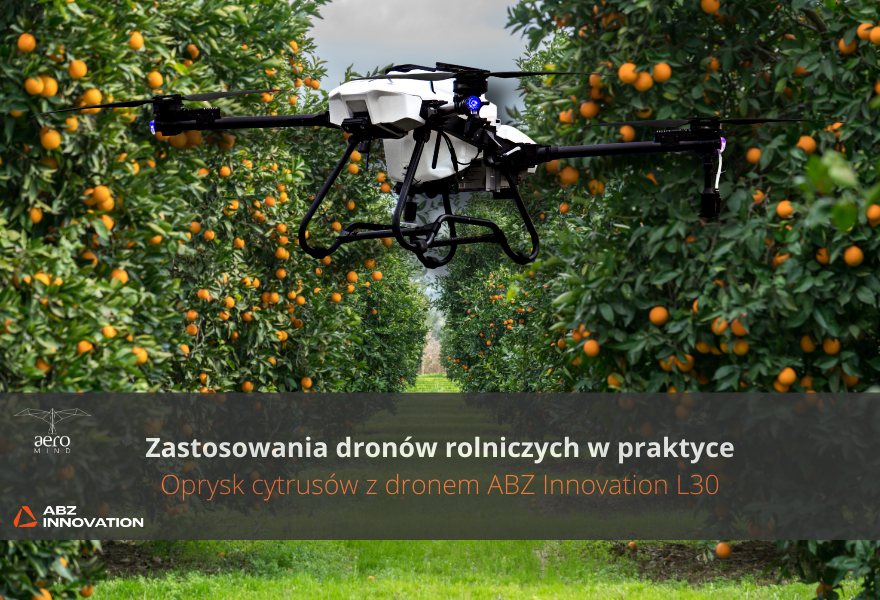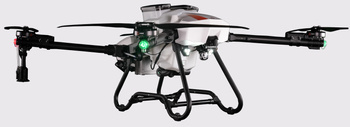Agricultural drone use cases: Citrus spraying with the ABZ Innovation L30 drone

Citrus plantations require precise and efficient spraying to protect crops from pests and diseases while minimizing resource use. Traditional spraying methods are often resource-intensive, requiring large volumes of water and chemicals, and can be challenging to apply evenly across dense canopies. The ABZ Innovation L30 drone offers a revolutionary solution, enabling farmers to achieve optimal spraying results with significantly reduced water usage and improved efficiency.
Significant Water and Chemical Savings
In traditional citrus plantation spraying, farmers typically use around 2000 liters of water per hectare to achieve adequate coverage. However, by utilizing the ABZ Innovation L30 drone, farmers have been able to reduce water usage to just 200 liters per hectare without compromising on effectiveness. This 90% reduction is made possible by the drone’s advanced design and technology, which ensures thorough and even distribution of spray droplets.
The L30 drone’s propellers generate a downward airflow that penetrates the citrus tree canopy effectively, reaching even the most difficult areas. This airflow, combined with the drone’s precise spraying capabilities, allows for a more uniform application of the spray, ensuring that all parts of the tree, including those deep within the canopy, receive adequate coverage.
Advanced Spraying Technology
The L30 drone is equipped with a Controlled Droplet Application (CDA) system that produces perfectly sized droplets for optimal coverage. The droplet size can be adjusted via the app on the touchscreen transmitter, allowing farmers to tailor the spray according to the specific needs of their crops and environmental conditions. This flexibility ensures that the spraying is both efficient and effective, minimizing waste and maximizing the impact of the applied chemicals.
With this setup, a single L30 drone can cover approximately 2-3 hectares per hour, significantly increasing the efficiency of spraying operations compared to traditional methods.
Workflow and Automation
The workflow for using the L30 drone in citrus plantations begins with meticulous planning. The pilot first identifies the barriers and obstacles within the area to be sprayed, such as tree lines, irrigation systems, or buildings. This information is then fed into the app, which automatically designs the most efficient flight route for the drone.
Once the flight route is set, the L30 drone follows the planned path and sprays the preset volume per hectare, carefully adjusting the flow rate according to the drone’s speed and the mission’s working width. This automated process ensures that the application is consistent and accurate, reducing the likelihood of over- or under-spraying.
When the drone’s tank is empty, it automatically returns home for a refill and then resumes spraying from the exact spot where it left off. This feature minimizes downtime and ensures continuous operation, maximizing productivity during critical spraying windows.
Economic and Environmental Benefits
The use of the L30 drone in citrus plantations offers significant economic and environmental benefits. The reduction in water usage alone translates to considerable savings on resources, but the advantages extend far beyond that.
- Petrol and Operating Cost Savings: Traditional spraying methods often involve heavy machinery that consumes large amounts of fuel. By switching to drone-based spraying, farmers can drastically reduce their petrol consumption and lower the overall operating costs associated with maintaining and running machinery.
- Reduced Environmental Impact: The precision and efficiency of the L30 drone minimize chemical runoff and over-application, reducing the environmental impact of spraying. This not only protects the surrounding ecosystems but also helps maintain soil and water quality on the plantation.
- Labor Efficiency: The automated nature of the L30 drone reduces the need for manual labor in the spraying process. This allows farm workers to focus on other critical tasks, improving overall farm management and productivity.
The ABZ Innovation L30 drone represents a significant advancement in agricultural spraying, particularly for citrus plantations. Its ability to reduce water usage, optimize chemical application, and automate the spraying process offers farmers a powerful tool for improving efficiency and sustainability. By adopting drone technology, citrus farmers can not only achieve better crop protection but also enjoy substantial cost savings and reduce their environmental footprint. As the agricultural industry continues to evolve, the L30 drone is poised to become an essential component of modern farming practices.


